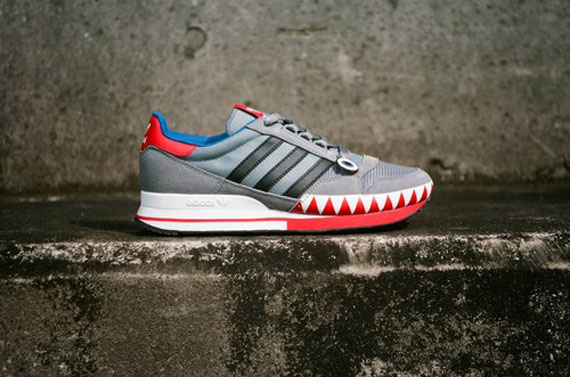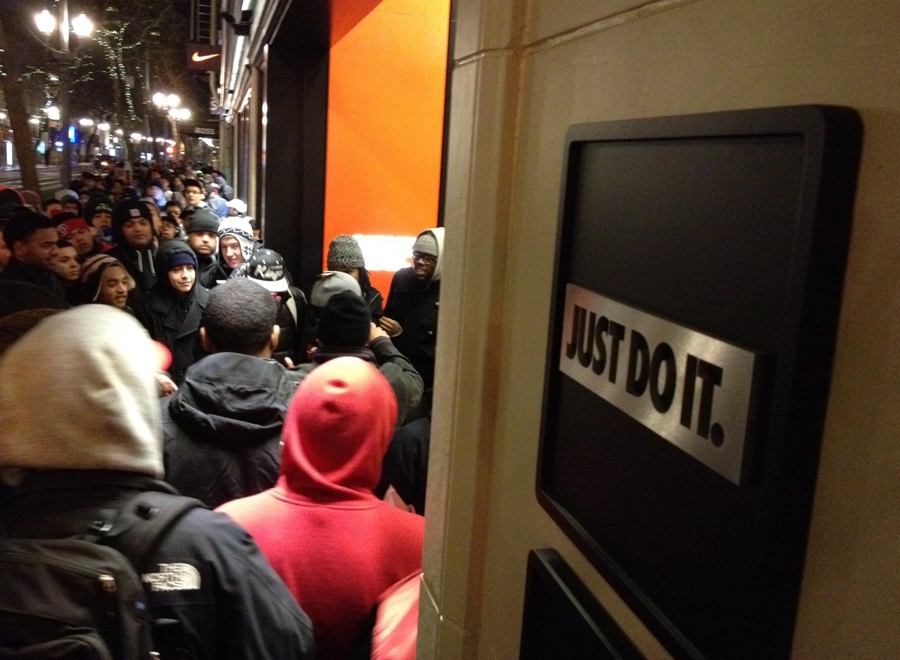
With every passing year, the hoops that must be jumped through in order to obtain a pair of limited or highly-coveted sneakers are rearranged to reflect the still-growing community of sneakerheads worldwide. At the dawn of the era it was all about the campout; you’d set your chair, sleeping bag, or woodland-grade tent up and play the waiting game for hours, or days, at a time in order to grab that pair of Nike SB Dunks, Air Maxes, or what have you. It could only last for so long though, and as the 2000s progressed, lines continued to get longer and episodes of sneaker mayhem at major releases seemed less and less like isolated events. A change had to be made, and it was industry leader Nike that decided to put the much-needed change into place.
Thus began the ongoing saga of Twitter RSVPs, Twitter link only releases, and Nike’s on-going battle against the bots. There’s no doubt that the Swoosh has largely ushered out the era of the campout, but they have in turn ushered an entirely new era of sneaker purchasing that is not without it faults. Gathered here at Nike’s various efforts over the past couple of years to streamline this process and make the system as fair as possible. The game at this point is a cat and mouse one, and every innovation or change made on behalf of Nike is no doubt being followed up by RSVP and add-to-cart services doing their best to adapt. Are we better off in this new era of sneaker releases than we were before? Has Nike done enough to insure that that sneaker purchasing is as fair as it will ever be? Recap the various events that got us here below and then let us know your thoughts on those questions down in the comments.

Nike Launches Twitter RSVP – April, 2012
Nike caught plenty of heat back in 2012 thanks to the chaos caused by the release of the “Galaxy” Nike Air Foamposite One. In the months following they launched the Twitter RSVP system, which sought to end the phenomenon of long line-ups and campouts, and in turn the chaos that sometimes ensued, by allowing users to secure coveted pairs via Twitter. A handful of verified Twitter accounts associated with official Nike stores across the country would announce in advance the day that the RSVP would go down, and then tweet out the necessary keyword on the day – at which point users had to send a DM back featuring their name, size, and the keyword. The Air Jordan XII “Playoffs” was the first sneaker to launch using the RSVP system.
Read More: Nike Institutes New Twitter RSVP Release System
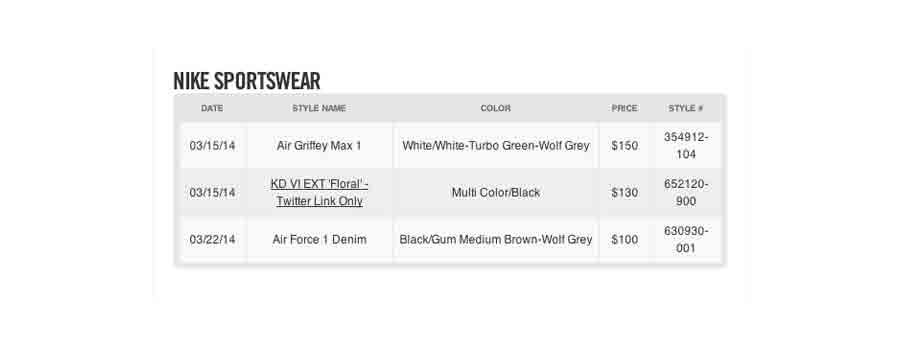
Nikestore Launches Twitter Link Only Releases – February, 2013
Twitter would become all the more necessary as far as sneaker purchasing online when Nike introduced “Twitter link only” releases. The first of these was the Air Jordan III ’88, which was scheduled at a very specific release time coinciding with the 25th anniversary of Michael Jordan’s Slam Dunk Contest performance in the shoe. Since then, Nikestore’s crop of Saturday morning releases usually features more coveted/limited pairs as “Twitter link only” launches – meaning that you can’t get to the product without clicking on the unique link tweeted out by Nikestore at 8AM EST on the day in question. As seen above, it’s still in use today.
Read More: Air Jordan III ’88 Twitter Link Only Release

Nike Updates Twitter RSVP with Photo – March, 2013
It quickly became clear that Nike’s Twitter RSVP system was exploitable. Services had by this time popped up that sold RSVP slots, enabled by “bots” that automatically detected when an RSVP tweet was sent out and responded with the necessary info faster than a human possibly could. Nike’s first response was to introduce a photo into the equation and prompt users to locate the circled keyword in that image (In turn making things a bit more difficult for those wishing to exploit and automate the process).
Read More: Nike Updates Twitter RSVP System
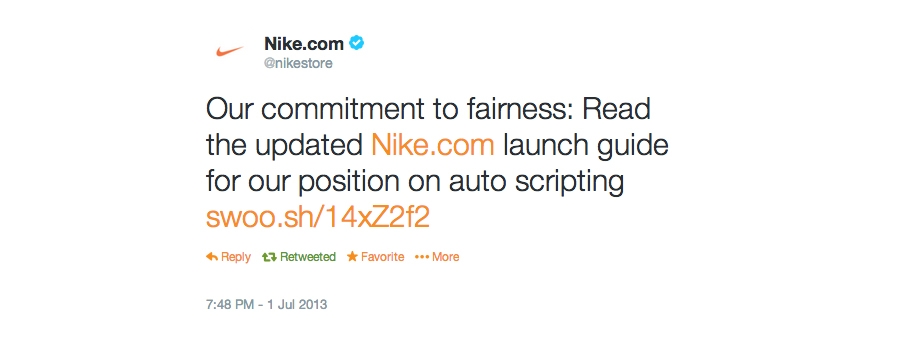
Nike Updates Twitter RSVP Terms of Service – July, 2013
While Nike has not too often officially confirmed the existence of bots and services exploiting the Twitter RSVP system, they did make an update to the official rules back in July, 2013 indicating that they were aware of the state of affairs. The update mentioned their commitment to fairness and their willingness to “ban any users who make threats, harass or attempt to cheat the system by opting into programs that provide them an unfair advantage”.
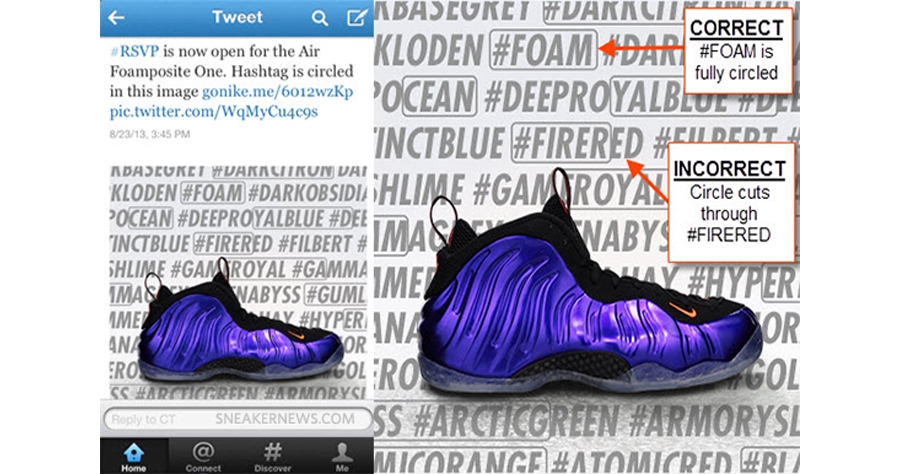
Nike Updates Twitter RSVP Photo – August, 2013
Nike has continued to tweak the Twitter RSVP system since its introduction. This change, made in August of last year, made the detection of the keyword a bit more difficult. This iteration of the system, the one currently in place, features words all over in the background of the image, with some of them being partially circled and the correct keyword being entirely circled (See image for example). This seems to be the best version of Twitter RSVP yet as far as combating bots and the like, but it’s worth mentioning that RSVP services and the like still claim to be able to secure spots.
Read More: Nike Modifies Twitter RSVP Process
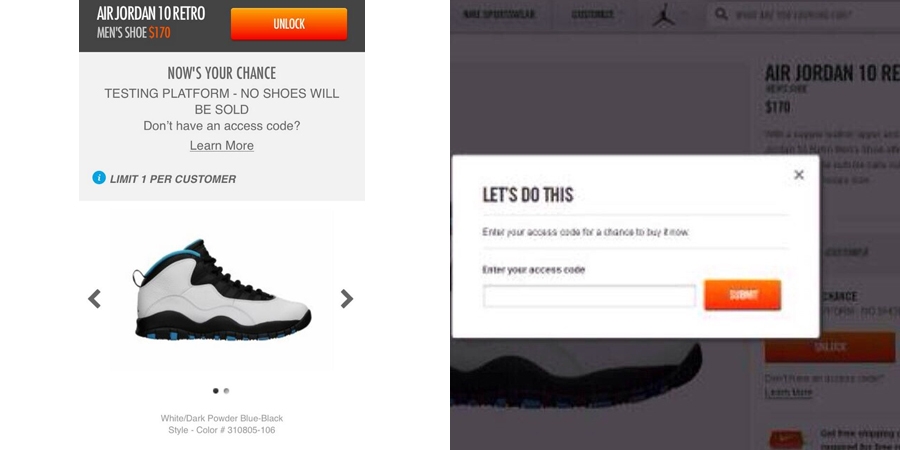
Nike Access Codes – February, 2014
In February of 2014 the sneaker community was again alerted to a possible changed being introduced to the sneaker purchasing game, this one pertaining to Nikestore (Nike’s online retail presence) rather than to the Twitter RSVP process. The Nike Access Codes were the source of the chatter. These codes were originally launched in conjunction with the pre-order for the Nike LeBron 11 “NBA 2K14”, but some users with early-access links for that weekend’s Air Jordan 10 “Powder Blue” launch reported being asked for an access code upon adding a pair to their cart. This system has yet to be put into place and it remains to be seen whether or not you’ll need a Nike Access Code to purchase certain sneakers online in the future.
Read More: Nike Access Codes
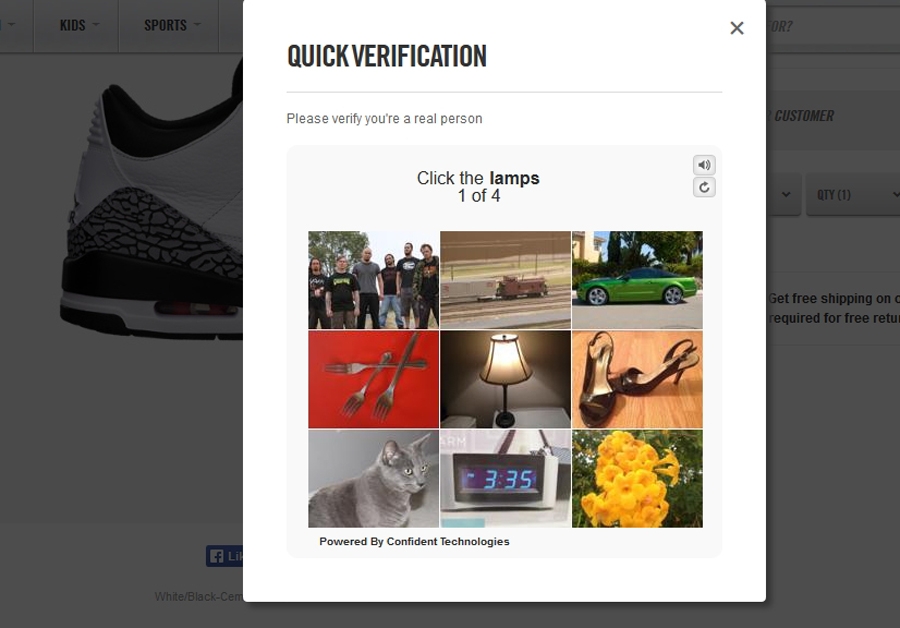
Nikestore Checkout Verification – March, 2014
Over the weekend, Nikestore launched one of the most lauded in their efforts to combat bot-usage and add-to-cart services. Their surprise checkout verification hit users attempting to purchase either the Air Jordan 3 “Infrared 23” or the Nike Kobe 9 Elite “Perspective” with a set of photos to connect words to or a math equation to prove that they were indeed human. Rumors regarding such an update had been circulating online and many users were happy to see it show up on Saturday morning, even if some were blindsided by the extra step.
Read More: Nikestore Photo Verification
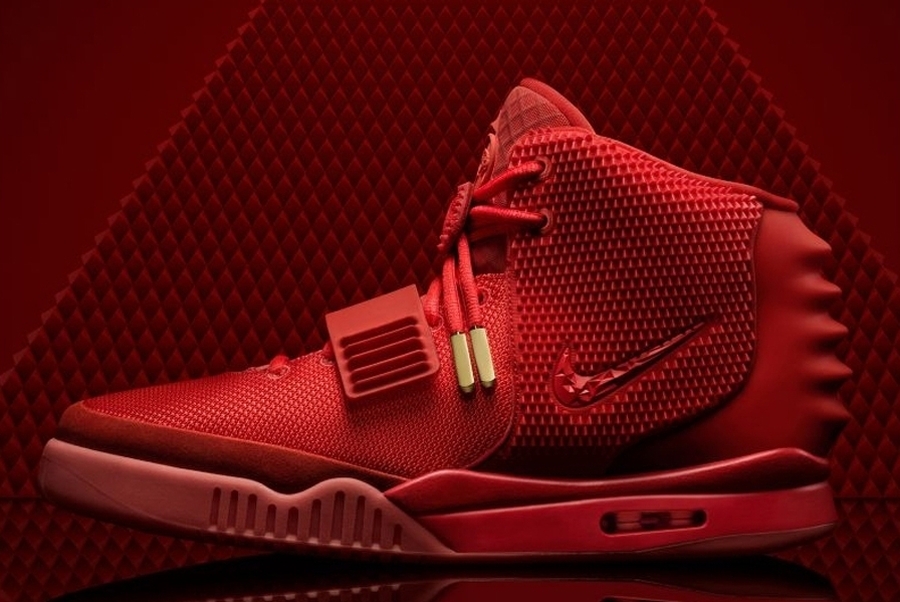
Nike Cancels Midnight Releases and Introduces Random Restocks
A couple more pieces of the puzzle as far as Nike’s attempts to thwart automatic purchasing and eliminate sneaker-related chaos are Nike’s putting an end to the era of midnight releases and their introduction of massive restocks featuring a load of coveted items from a particular season. The abolishing of midnight releases was mostly a safety issue, with early morning releases being easier on managers at Nike and the various big-box retailers. Nikestore was also affected though; sneakers were now available at 8AM EST rather than midnight.
One of the last items to mention among Nike’s attempts to combat exploitative purchasing is their celebrated random restocking – usually made available via a Twitter link from @Nikestore, usually alluding to some of the season’s hottest styles being available again. This method has caught bots off guard and allowed many a second chance at tough to obtain pairs. Granted, those pairs are usually gone in a matter of seconds, but at least you’re battling against humans rather than bots. This random launch time has also been successful for individual releases like the various Air Yeezy 2s, each of which were announced as available via Twitter without any warning.
Read More: Nike Cancels Midnight Releases
Read More: Random Restocks


